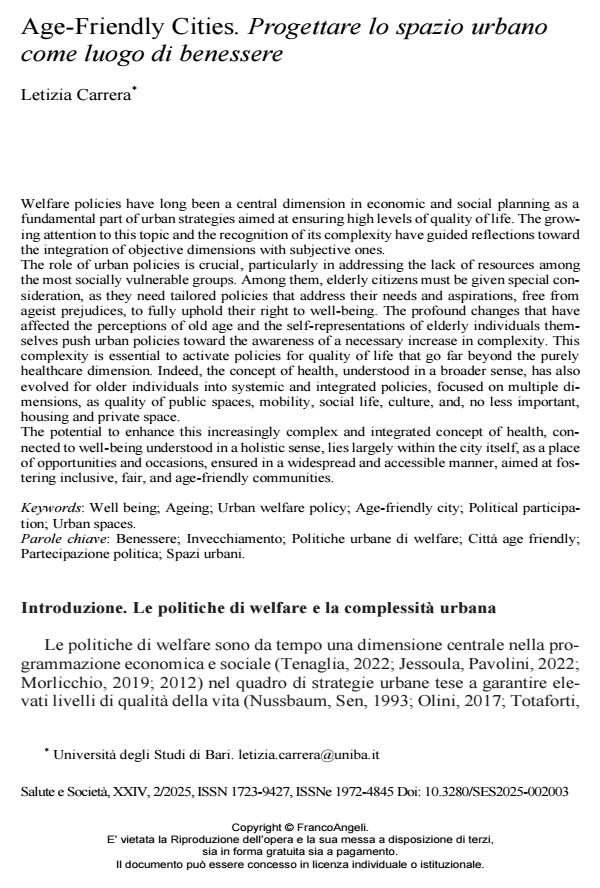Age-Friendly Cities. Progettare lo spazio urbano come luogo di benessere
Titolo Rivista SALUTE E SOCIETÀ
Autori/Curatori Letizia Carrera
Anno di pubblicazione 2025 Fascicolo 2025/2
Lingua Italiano Numero pagine 16 P. 20-35 Dimensione file 463 KB
DOI 10.3280/SES2025-002003
Il DOI è il codice a barre della proprietà intellettuale: per saperne di più
clicca qui
Qui sotto puoi vedere in anteprima la prima pagina di questo articolo.
Se questo articolo ti interessa, lo puoi acquistare (e scaricare in formato pdf) seguendo le facili indicazioni per acquistare il download credit. Acquista Download Credits per scaricare questo Articolo in formato PDF

FrancoAngeli è membro della Publishers International Linking Association, Inc (PILA), associazione indipendente e non profit per facilitare (attraverso i servizi tecnologici implementati da CrossRef.org) l’accesso degli studiosi ai contenuti digitali nelle pubblicazioni professionali e scientifiche.
Welfare policies have long been a central dimension in economic and social planning as a fundamental part of urban strategies aimed at ensuring high levels of quality of life. The growing attention to this topic and the recognition of its complexity have guided reflections toward the integration of objective dimensions with subjective ones. The role of urban policies is crucial, particularly in addressing the lack of resources among the most socially vulnerable groups. Among them, elderly citizens must be given special consideration, as they need tailored policies that address their needs and aspirations, free from ageist prejudices, to fully uphold their right to well-being. The profound changes that have affected the perceptions of old age and the self-representations of elderly individuals themselves push urban policies toward the awareness of a necessary increase in complexity. This complexity is essential to activate policies for quality of life that go far beyond the purely healthcare dimension. Indeed, the concept of health, understood in a broader sense, has also evolved for older individuals into systemic and integrated policies, focused on multiple dimensions, as quality of public spaces, mobility, social life, culture, and, no less important, housing and private space. The potential to enhance this increasingly complex and integrated concept of health, connected to well-being understood in a holistic sense, lies largely within the city itself, as a place of opportunities and occasions, ensured in a widespread and accessible manner, aimed at fostering inclusive, fair, and age-friendly communities.
Parole chiave:Benessere; Invecchiamento; Politiche urbane di welfare; Città age friendly; Partecipazione politica; Spazi urbani.
Letizia Carrera, Age-Friendly Cities. Progettare lo spazio urbano come luogo di benessere in "SALUTE E SOCIETÀ" 2/2025, pp 20-35, DOI: 10.3280/SES2025-002003